Report: US, Israel sign secret pact to tackle Iran nuclear and missile threat
‘Dramatic understandings’ were agreed at the White House on December 12, and deal signed by the two countries’ national security chiefs, Channel 10 says
Times of Israel
December 28, 2017, 8:58 pm
December 28, 2017, 8:58 pm
.
Prime Minister Benjamin Netanyahu, right, and US President Donald Trump shake hands at the Israel Museum in Jerusalem, May 23, 2017. (AP/Sebastian Scheiner)
Israel and the United States have secretly signed a far-reaching joint memorandum of understanding providing for full cooperation to deal with Iran’s nuclear drive, its missile programs and its other threatening activities, an Israeli TV report said.
The document was signed on December 12 at the White House, culminating intensive talks between representatives of the major Israeli and American intelligence and defense hierarchies, headed by the US and Israeli national security advisers, H. R. McMaster and Meir Ben-Shabbat, respectively, the Channel 10 report said Thursday.
Citing both American and Israeli officials, the report said the document was designed to translate into “steps on the ground” the positions set out by US President Donald Trump in his October 13 speech on Iran, in which he decertified the Iran nuclear deal.
President Donald Trump, right, speaks as Army Lt. Gen. H.R. McMaster, left, listens at Trump’s Mar-a-Lago estate in Palm Beach, Fla., Monday, Feb. 20, 2017, where Trump announced that McMaster will be the new national security adviser. (Screen capture/YouTube)
At what the TV report described as a “secret” meeting at the White House, the US and Israel set out a joint agreement on strategy and policy regarding Iran. Specifically, they agreed to set up joint teams to handle various aspects of the Iranian threat.
One such joint team, the report said, will deal with Iranian activity in Syria and Tehran’s support for the Hezbollah terror organization.
Another joint team will deal with both diplomatic and intelligence activities designed to grapple with Iran’s nuclear weapons ambitions.
A third joint team, it was reportedly agreed, would grapple with Iran’s ballistic missile program and its efforts to build accurate missile systems in Syria and Lebanon.
Finally, a fourth team would oversee preparation for any escalation by Iran and/or Hezbollah.
McMaster and Ben-Shabbat signed the joint document, the TV report said, quoting a “senior US government” source and “senior Israeli officials.”
Quoting the Israeli officials, Channel 10 said that the meeting confirmed that the US and Israel “see eye to eye on the trends and processes in the region,” and have now reached agreement on the strategy and policy required to deal with them.
“With all due respect to President Trump’s [December 6] declaration on Jerusalem [as the capital of Israel]” Channel 10 reporter Barak Ravid said, the December 12 “dramatic understandings” would have “a far greater impact on the security of Israel’s citizens.”
In a speech on October 13, Trump announced he would not recertify the Iranian nuclear deal, and outlined a new, tougher approach toward Tehran.
Trump said he was launching the new strategy to check Iran’s “fanatical regime” and warned that 2015’s landmark international nuclear deal could be terminated at any time.
US President Donald Trump speaks about the Iran deal from the Diplomatic Reception room of the White House in Washington, DC, on October 13, 2017. (AFP/Brendan Smialowski)
Trump stopped short of withdrawing from the accord, but “decertified” his support for the agreement and left its fate in the hands of Congress.
“We cannot and will not make this certification,” he said. “We will not continue down a path whose predictable conclusion is more violence, more terror and the very real threat of Iran’s nuclear breakout.”
In addition, outlining the results of a review of efforts to counter Tehran’s “aggression” in a series of Middle East conflicts, Trump ordered tougher sanctions on Iran’s Revolutionary Guards Corps and on its ballistic missile program.
Trump said the agreement, which defenders say was only ever meant to curtail Iran’s nuclear program in return for sanctions relief, had failed to address Iranian subversion in the region and its illegal missile program.
The US president said he supported efforts in Congress to work on new measures to address those threats without immediately torpedoing the broader deal.
In this Sept. 30, 2015 file photo released by the official website of Khamenei’s office, Supreme Leader Ayatollah Ali Khamenei attends a graduation ceremony of Iranian Navy cadets in the northern city of Noshahr, Iran. (Office of the Iranian Supreme Leader via AP)
“However, in the event we are not able to reach a solution working with Congress and our allies, then the agreement will be terminated,” Trump said in a televised address from the Diplomatic Room of the White House. “It is under continuous review and our participation can be canceled by me as president at any time,” he warned.
He added later, speaking of Congress, “They may come back with something that’s very satisfactory to me, and if they don’t, within a very short period of time, I’ll terminate the deal.”
Trump announced targeted sanctions on the Revolutionary Guards, a key instrument of Tehran’s military and foreign policy that the president described as “the Iranian supreme leader’s corrupt personal terror force and militia.”
He said he was authorizing the US Treasury Department to “further sanction the entire Islamic Revolutionary Guard Corps for its support for terrorism and to apply sanctions to its officials, agents, and affiliates.”
But the US leader backed away from designating the Guards as a terror group, a move that would have triggered a slew of sanctions and almost certain Iranian retribution.
Trump said he planned to ensure “Iran never — and I mean never — acquires a nuclear weapon.”
He accused the Obama administration of lifting sanctions on Iran as part of the 2015 nuclear accord “just before” they could cripple the regime and bring it to collapse.
“The Iran deal is one of the worst and one-sided transactions the United States has ever entered into,” he said. “In just a few years, as key restrictions disappear, Iran can sprint toward nuclear weapons breakout… What is the purpose of a deal that, at best, only delays [Iranian nuclear ambitions]?“ he asked.
Furthermore, Trump said Tehran had failed to live up to certain parts of the agreement as well as “the spirit of the deal.”
He said Iran was “under the control of a fanatical regime” that has “spread death, destruction and chaos all around the globe.” He warned that “history has shown that the longer we ignore a threat the more dangerous that threat becomes.”
“The regime’s two favorite chants are ‘Death to America’ and ‘Death to Israel,’” he noted.
He described Tehran as “the world’s leading state sponsor of terrorism,” saying it backs Al-Qaeda, the Taliban, Hezbollah, Hamas and “other terrorist networks,” and warning of “the increasing menace posed by Iran.”
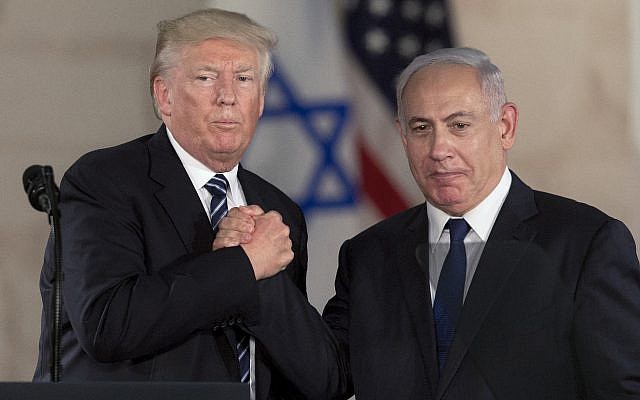
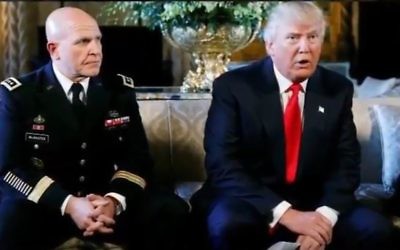

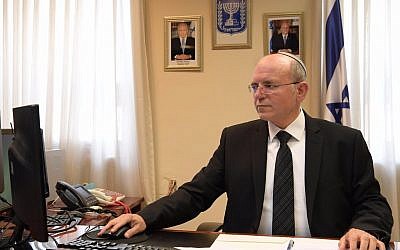
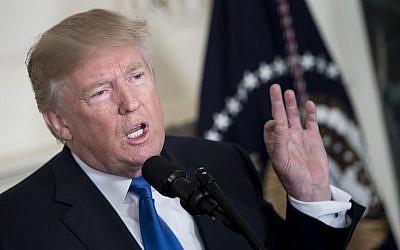
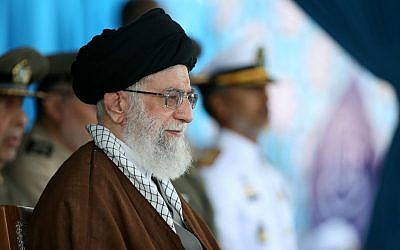
Comments
Post a Comment